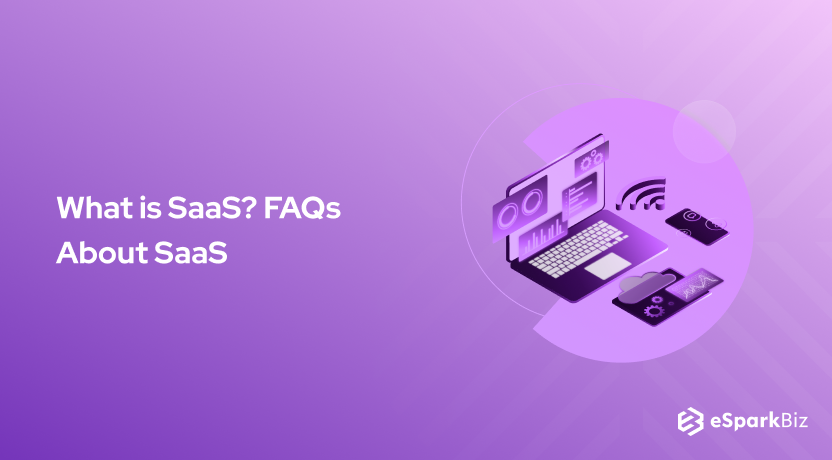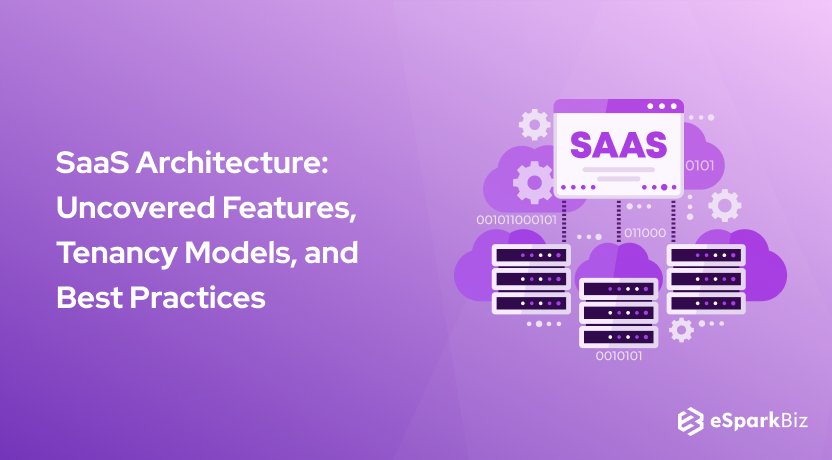Software as a Service (SaaS) offers a plethora of benefits to users, supporting them to run businesses online. Since traditional software licenses have become so expensive, the demand for SaaS-like cloud-based software has increased and is the talk of the trend as well.
What is Software as a Service? It is a software licensing and business delivery model in which licensing can be availed in the form of a subscription.
Some of the ideal benefits of SaaS are a ready-to-use model with reduced time, lower costs, easy integration and high scalability, timely upgrades, and proof of concepts.
Top Software as a Service FAQs
This blog presents the top frequently asked questions of users, which can be useful for new SaaS users.
What is SaaS?
What is SaaS? This could be a daunting question among several business owners who are keen to develop their business with the aid of modern technologies.
SaaS – Software as a Service is a systematic procedure of delivering software applications that allow data access from any device with an active Internet connection through a web browser.
It is a web-based model that allows software vendors to host and manage the servers, codes, and databases of the application developed.
There are two solid reasons for how a SaaS application differentiates from traditional on-premise software.
- SaaS product deployments do not wait for any extensive hardware to be installed. This quality allows businesses to outsource their majority of IT responsibilities and reduces the time and cost involved in in-house troubleshooting and maintenance of the software.
- Secondly, SaaS products cut down the cost involved in paying upfront licensing fees like how it happens with a traditional software model since it allows users to purchase on a subscription basis. You should know the Cost To Build SaaS Application.
I Hope, this section offered a clear answer for SaaS Meaning, SaaS definition, what does SaaS stand for and how does software as service work.
Well, people may feel it is difficult to understand what a SaaS company is. And what functions they provide.
In simple words, a SaaS company and its operation can be defined as a hosting company that hosts an application on its server that allows users/customers to access it via the internet.
SaaS Application vs On-Premise: How to Choose?
Before answering this question, it is viable to understand your business complexity and to validate whether preferring SaaS is the best choice.
- How unique are you from your competitors in the industry?
- Do non–custom made products provide the attributes you need?
- What is the level of customization you look for in your business?
SaaS products highly support businesses with a lower budget, since for any business the primary concern would be the budget.
But the pricing models offered by SaaS help start-up companies to spread the total capitalization over time. This provides an opportunity for start-ups and small businesses to adopt potent and modern software.
Now buyers need not think of compromising between functionality and flexibility because most cloud-based software delivers the same experience as to how on-premise software does.
Even though cloud-based business solutions are in high peak, yet the need for the usage of traditional on-premise software like Tally ERP is still followed as the best practice by certain manufacturing industries.
What is SaaS Software History?
The SaaS software history is incredible and inspired by a speech by John McCarthy who is a computer scientist, which won the Turing award for his rigorous work in artificial intelligence.
In a tweaked manner, we can also say this as cloud computing is a concept that took a shape as a shared resource of computing power.
To support web-based technology like SaaS, companies needed Salesforce to create cloud software and also offer traditional enterprise solutions like customer relationship management. Also, knowing the Challenges of Cloud Computing matters a lot.
Though it took a decade for SaaS products to reach the entire enterprise software, the number of businesses using SaaS as a service has increased.
Can I Customize SaaS Software?
Yes, of course, any web-based solution is customizable depending on whether it is a business or personal need.
It is easy for buyers to design their features such as user interface design and modify certain areas like data fields to determine which data should be displayed on the application.
Moreover, it also allows enabling /disabling of your desired features in the application.
The best example would be the dashboard of any project management application. The decision of displaying which data should appear on the dashboard can be decided at your end.
Who Owns SaaS Product Data?

The best part with SaaS is having control of all your data completely at your end in most cases.
At the same, many businesses have their service level agreements for storing all the SaaS product data on the vendor’s server and they own the rights of accessing the data at any time.
By the way, the majority of the SaaS contracts laid by the businesses have built-in provision for accessing their business or SaaS product data directly.
By doing so, business owners maintain the right to access all those data even though vendors shut their operations.
Also Read: Step-by-Step Guide On SaaS Product Development
Is My SaaS Application Data Safe In Cloud?
Almost every vendor knows the importance of keeping their client’s data safe and secure. Owing to that they mostly prefer highly secured public cloud service with high-level cloud security.
Companies that lack funds opt to maintain their SaaS product data in-house server with a high-risk factor, this may lead to data leakage.
Well, there has been a pro-long debate going over cloud security especially for the ERP systems but we are not getting into that.
The real truth about the data security is SaaS vendors are ready to invest a lot in gaining high-level security, data backups, and data maintenance.
What If My SaaS Organization Vendor Goes Out Of Business?
It doesn’t matter whether software vendors are active or inactive in business, most of the SaaS vendors pay-in-advance to their hosting company for hosting their SaaS data and make sure it is kept safe & alive all time.
The pre-pay fee made by the SaaS vendors covers the safety and to safeguard the company’s SaaS product data at all times and to ensure the accessibility of the data by the SaaS vendors.
What Are Internet & Operating System Limitations?
Well, the primary downfall of SaaS could be the reliability of a good internet connection. Yes! SaaS systems highly rely on the internet connection for delivering better performance.
No SaaS system capable of eliminating the downtime at all. Because of that, few SaaS vendors opted to develop the ‘offline’ functionality of their SaaS system to get rid of the online dependability.
However, still, the SaaS system’s compatibility with the operating system could be a worry for the SaaS vendors. Currently, SaaS systems are accessible via web browsers along with the OS agnostic.
SaaS Definition vs Cloud Definition: What Is The Major Difference?
Cloud technology involves a complex infrastructure that includes multiple computers, servers, and numerous databases.
In simple, cloud technology can be easily pointed as a thing that can be hosted at any remote place and can be accessed via the internet.
Meanwhile, SaaS is a software application specifically designed for businesses and functions via cloud technology. At the same time, cloud programs function by keeping underlying software mostly SaaS.
What Is a Private Cloud?
The private cloud is almost similar to the public cloud while comparing the infrastructure technology, user’s functionality, and data accessibility.
However, on a private cloud instead of sharing the computing power and data among the public computers, the computing power and data shared within the company or among the users of a single company.
Will My SaaS Data Remain Secure?
In cloud technology, the most prominent question raised would be data security. Modern SaaS vendors are ready to spend a lot of money on data security, data backups, and server maintenance.
Also, several SaaS vendors perform several audits over the security procedures followed by the hosting company and make sure the data center security level is above the par level.
Is Software As A Service A New Concept?
Many believe that the concept of resource sharing environment origins in the recent past but it was wrong. The cloud computing concept boomed way back in the 1960s.
However, the idea of developing web-based technology that supports SaaS sparked during the late 1990s.
But in the last 5 years, there has been a dramatic development on the SaaS system and SaaS solutions become a prominent and inevitable thing for large companies all over the world.
What Are Some Of The Famous Examples Of SaaS Applications?
Well, many may use SaaS products without knowing it as a SaaS product. Here are the few SaaS products that are commonly used by people all over the world.
- Google Drive by Google
- Gmail by Google
- MS Office 365 by Microsoft
- Amazon AWS
- Oracle
- Salesforce
- Adobe
- Intuit
- Hubspot
- Slack
- Shopify
- Zoom
- GitHub and many more
What Are The Biggest Advantages Of SaaS?
Here are the few vital advantages of SaaS:
- There is no need to maintain or download the data on the user’s system
- User may find easy and flexible subscription-based payment models
- Allows business owners to opt only the features which are required for their businesses on the SaaS system
- SaaS system or product can be easily accessible from all over the world
What Are The Biggest Disadvantages Of SaaS?
Take a look over the drawbacks which are marked by the people who using SaaS products
- SaaS products can’t be owned, the accessibility will be dead once the users or vendors stop paying for it
- SaaS product data accessible will be dead once the vendor prefers to stop using SaaS services
- Integration of SaaS product with other application is always a complex thing to do
Why Is SaaS So Complex To Understand?
Many users or vendors feel difficult to understand the functionality of SaaS products mainly because of the ways in which SaaS services are delivered by the SaaS product. Yes! SaaS products deliver services in a variety of ways.
Which Industries Are SaaS Bracketed With?
SaaS is well-known as the branch of cloud computing and it requires proper internet connectivity for delivering better performance and to carry out functionality for delivering its services. People from various niches prefer SaaS products for their business operation.
In most cases, people bracket SaaS products for performing Tech or IT operations in general. Apart from that people who are involved in marketing and copywriting niches also prefer SaaS products for availing digital shopping platforms delivered by SaaS services.
How Does SaaS Impact A Business?
When compared with software, SaaS delivers various advantages to businesses particularly on improving buyers’ base with a strong and easy subscription-based model.
Apart from that, updates of businesses can be delivered to potential audiences faster in SaaS when compared with software.
Besides, customization of SaaS can be done easily according to the individual buyers or users which can’t be done in normal software.
Which Industries Are Affiliated With SaaS?
Though SaaS systems are used mostly by Tech or IT companies, SaaS is not limited, it can be used widely in any industry or niches.
Here are the lists of niches on which one can utilize SaaS effectively for witnessing a better performance.
- ERP
- Finance & Accounting
- Business Productivity
- Marketing & Sales
- Automation Software
- Digital Solution
- eCommerce
- Human Resource Department
- IT management and many more
What Is Horizontal & Vertical SaaS?

- Horizontal SaaS Services that are focused on an array of categories or skills. Mostly, horizontal SaaS services are highly utilized by marketing, automation, human resource, and IT niches.
- Vertical SaaS General compared with the T-shaped marketing techniques, the vertical SaaS services are specific to the particular niches such as eCommerce, project management, and so.
What License Under Which SaaS Is Sold?
The majority of the companies are utilizing the SaaS services under the license of a perpetual license.
Well, the perpetual license permits the users or vendors to store the SaaS data and use the SaaS services without owning rights.
In simple terms, you can term it as a pay-as-you-go. However, in the case of software, the user or vendor owns the complete solution.
Also, SaaS vendors or users provided with the license on the subscription basis but the SaaS licenses are for a lifetime.
What Is The Nature & Architecture Of SaaS?
Being a cloud computing branch, SaaS possesses the nature of multi-tenancy.
In the technical world, multitenancy is usually referred to as the software architecture that permits rendering certain services again and again on a specific server or certain group of servers
It allows multiple people or organizations to access it numerous times.
In software multi-tenancy, the people who access the services on the same server referred as the ‘tenants’ with the power of utilizing the same services on the same space for numerous times.
Why Is SaaS So Famous?
There are many reasons that make SaaS solutions famous among large companies. Here we have listed the top few reasons that make SaaS as the talk of the town.
- SaaS delivers more potential audiences when compared with software
- SaaS works on the Internet and has web-based UI which is more attractive when compared with software
- Being a web-based model, developing a SaaS product is much easier when compared with the development of Software
- SaaS product development is on the current trend which gives a competitive edge
- SaaS services are faster when compared with the software services
- Uses of HTTPS and SSL makes the SaaS services far safer than the software services
What Are the Challenges Of SaaS Application Development?
Well, things aren’t that easy when it comes to using SaaS services. Here are the few vital challenges and limitations developers face while developing a potential SaaS product or application.
- When it comes to SaaS services, owning the SaaS data is never possible and it causes big trouble for several SaaS companies around the world.
- Customization of SaaS services according to the ‘tenants’ is so difficult for small or medium companies to use SaaS solutions. However, it isn’t a problem for bigger companies like AWS.
- Data privacy becomes an issue when saas development company require to integrate certain sensitive data with the ‘tenants’ personal computer.
- Finally, no guarantee for delivery standard uptime by the SaaS Company as per the SLA agreement. There are possibilities of having technical caveats especially on internet connectivity which cause a serious impact on SaaS services
What Future Holds For SaaS Applications?
Being a branch of Cloud computing, SaaS attracts not only the start-ups and medium-scale businesses; the advantages of SaaS solutions are attracting even large companies with a giant workforce. Take a look over the future of SaaS applications
- Based on the statistical values, the global public cloud market reaches a whopping amount of more than to reach US$525.60bn in 2024.
- According to the recent study, nearly 1/3rd of the IT companies around the world invested in cloud computing.
- In the year 2022 the hybrid cloud market was US$ 54.34 Billion and is expected to reach US$ 201.45 Billion in 2032.
- Currently, nearly 90% of the active companies around the world have adopted cloud technology.
- Amazon cloud service or AWS is the leader in offering a SaaS solution. It owns 32% of shares around the world.
How To Know If I Can Trust The SaaS Vendor?
Well, before engaging with the SaaS vendor, business owners need to ensure the SLA (Service Level Agreement) covers all the necessary details.
Also, do test the SaaS services with the real data and make sure it meets the expectation of the business operation.
Along with that, here are a few points that need to look before shortlisting the SaaS vendor:
- How long is the vendor offering a SaaS solution?
- Whether the customer base of SaaS vendors has potential growth over the years?
- Whether the SaaS vendor has sufficient technology roadmap to handle all sorts of typical situations?
What Is The Difference Between SaaS, IaaS & PaaS?

- SaaS Software as a Service, it uses the internet to offer various services through applications. The third-party vendors manage SaaS systems and users don’t need to download or install any software for availing services.
- IaaS Infrastructure as a Service, which delivers services like data storage, network access, and virtualization-based on pay-as-you-go type. It allows a business to purchase resources based on the demands.
- PaaS Platform as a Service offers components and certain software that are handy for the application on accessing the cloud technology. It is almost similar to the SaaS but instead of delivering software, it offers a platform of the developers to create software.
How Can My Organization Adapt To SaaS-Based Solutions?
Here are the few tips that allow any organization to easily adapt to the SaaS-based solutions
- Conducting workshops for employees and high-level staffs and to teach them how SaaS differs from others and how it can be utilized effectively for the company or organization growth
- Planning a peculiar financial model that ensures the organization’s cash flow differently and easy monitoring and analyzes of cash spend
- Make sure the technical requirements of the organization meet the expectation before implementing the SaaS solution.
Who Benefits From SaaS?
In general, SaaS solutions offer a wide range of benefits to all types of organizations.
However, organizations that are likely to experience growth in the nearby future will benefit a lot by implementing the SaaS solution when compared with others.
The advantage of using the latest software solutions allows predicting and monitoring the cash flow of the business effectively.
Moreover, the advantage of accessing the SaaS system through the internet allows employees to access it at any time with any device that supports the internet.
Is SaaS Data Secure?
Data security is one of the most important things that every organization must look over. A SaaS vendor must ensure that the storage of SaaS data is in a highly secure environment. Several freemium SaaS vendors offer no guarantee for privacy and data permission policy.
So companies need to make sure they are approaching a trusted SaaS vendor who has strong privacy regulation along with a proper contract to have SaaS data secure.
Conclusion
Hope this article will act as an extensive guide for people keen to know What Is SaaS Software? And for those who are in search of how to find the right SaaS Organization, SaaS Application, SaaS Product for their organization or business.
Pick the right SaaS solution for your business by reading all those above-mentioned FAQs carefully and that ensures your organization’s growth in the near future with the power of efficient SaaS Solution.









